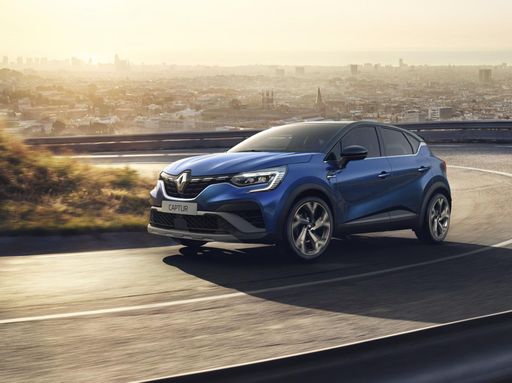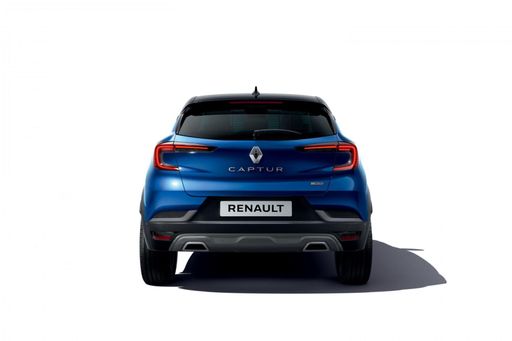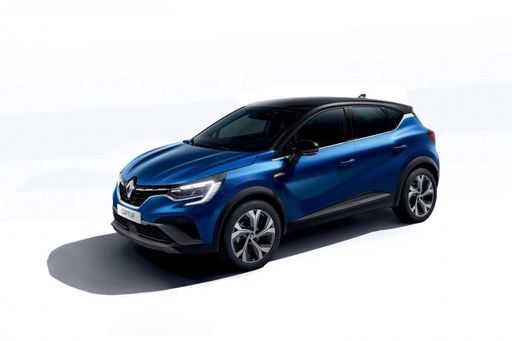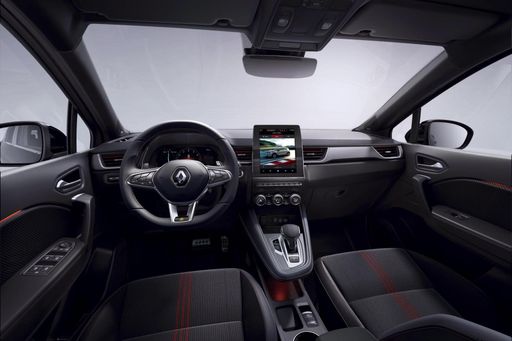Toyota Yaris vs Renault Captur – Differences & prices compared
Compare performance, boot space, consumption and price in one view.
Find out now: which car is the better choice for you – Toyota Yaris or Renault Captur?
The Toyota Yaris (Hatchback) comes with a Full Hybrid or Petrol engine and Automatic or Manuel transmission. In comparison, the Renault Captur (SUV) features a Petrol MHEV, Petrol or Full Hybrid engine with Manuel or Automatic transmission.
When it comes to boot capacity, the Toyota Yaris offers 286 L, while the Renault Captur provides 422 L – depending on how much space you need. If you’re looking for more power, decide whether the 280 HP of the Toyota Yaris or the 158 HP of the Renault Captur suits your needs better.
In terms of consumption, the values are 3.80 L per 100 km for the Toyota Yaris, and 4.50 L for the Renault Captur.
Price-wise, the Toyota Yaris starts at 21900 £, while the Renault Captur is available from 20100 £. Compare all the details and find out which model fits your lifestyle best!
Toyota Yaris
The Toyota Yaris exudes a charming blend of practicality and style, making it an appealing choice for urban drivers. Its compact design allows for easy manoeuvrability in crowded city streets, while the interior offers a surprisingly spacious and comfortable environment. With a focus on fuel efficiency and reliability, the Yaris remains a popular option for those seeking a balance between performance and economy.
details @ Toyota
@ Toyota
 @ Toyota
@ Toyota
Renault Captur
The Renault Captur is a compact SUV that combines stylish design with practical functionality, making it a popular choice for urban drivers. Its interior offers a versatile and comfortable space, featuring high-quality materials and modern technology. On the road, the Captur delivers a smooth and efficient driving experience, perfect for both city commutes and weekend adventures.
details @ renault-presse.de
@ renault-presse.de
 @ renault-presse.de
@ renault-presse.de
 @ renault-presse.de
@ renault-presse.de
 @ renault-presse.de
@ renault-presse.de

|

|
|
|
|
Costs and Consumption |
|
|---|---|
|
Price
21900 - 45000 £
|
Price
20100 - 28300 £
|
|
Consumption L/100km
3.8 - 9.5 L
|
Consumption L/100km
4.5 - 6 L
|
|
Consumption kWh/100km
-
|
Consumption kWh/100km
-
|
|
Electric Range
-
|
Electric Range
-
|
|
Battery Capacity
-
|
Battery Capacity
-
|
|
co2
87 - 215 g/km
|
co2
102 - 135 g/km
|
|
Fuel tank capacity
36 - 50 L
|
Fuel tank capacity
48 L
|
Dimensions and Body |
|
|---|---|
|
Body Type
Hatchback
|
Body Type
SUV
|
|
Seats
4 - 5
|
Seats
5
|
|
Doors
3 - 5
|
Doors
5
|
|
Curb weight
1090 - 1356 kg
|
Curb weight
1293 - 1514 kg
|
|
Trunk capacity
141 - 286 L
|
Trunk capacity
326 - 422 L
|
|
Length
3940 - 3995 mm
|
Length
4239 mm
|
|
Width
1745 - 1805 mm
|
Width
1797 mm
|
|
Height
1455 - 1500 mm
|
Height
1575 mm
|
|
Payload
289 - 525 kg
|
Payload
376 - 457 kg
|
Engine and Performance |
|
|---|---|
|
Engine Type
Full Hybrid, Petrol
|
Engine Type
Petrol MHEV, Petrol, Full Hybrid
|
|
Transmission
Automatic, Manuel
|
Transmission
Manuel, Automatic
|
|
Transmission Detail
Manual Gearbox, Automatic Gearbox, CVT
|
Transmission Detail
Manual Gearbox, Dual-Clutch Automatic, Automatic Gearbox
|
|
Drive Type
Front-Wheel Drive, All-Wheel Drive
|
Drive Type
Front-Wheel Drive
|
|
Power HP
116 - 280 HP
|
Power HP
91 - 158 HP
|
|
Acceleration 0-100km/h
5.5 - 9.7 s
|
Acceleration 0-100km/h
8.5 - 14.3 s
|
|
Max Speed
175 - 230 km/h
|
Max Speed
168 - 180 km/h
|
|
Torque
390 Nm
|
Torque
160 - 270 Nm
|
|
Number of Cylinders
3
|
Number of Cylinders
3 - 4
|
|
Power kW
85 - 206 kW
|
Power kW
67 - 116 kW
|
|
Engine capacity
1490 - 1618 cm3
|
Engine capacity
999 - 1789 cm3
|
General |
|
|---|---|
|
Model Year
2024 - 2025
|
Model Year
2024 - 2025
|
|
CO2 Efficiency Class
B, G
|
CO2 Efficiency Class
D, C
|
|
Brand
Toyota
|
Brand
Renault
|
Toyota Yaris
Introducing the Next-Gen Toyota Yaris: A Blend of Innovation and Technology
The Toyota Yaris has long been lauded for its efficiency, reliability, and practicality. As we venture into the 2024 model year, Toyota has upped the ante with the latest versions of this popular hatchback, melding cutting-edge technology with eco-conscious design. Here’s an in-depth look at what makes the current Yaris line-up stand out from the crowd.
Efficient Powertrains: Hybrid and Beyond
Spearheading the technological innovation in the Yaris range is the introduction of various hybrid models. The Yaris offers a 1.5-litre full-hybrid engine, marrying a petrol engine with an electric motor to produce between 116 and 130 PS. This power blend is controlled via a sophisticated CVT-gearbox, optimizing both performance and fuel efficiency, with consumption figures ranging from an impressive 3.8 to 4.2 litres per 100 km.
For those seeking pure performance, the GR Yaris variants provide a turbocharged 1.6-litre engine capable of producing 280 PS. This power is delivered via a choice of manual or automatic transmission, giving drivers the tactile involvement or convenience they desire.
Design that Fulfils and Inspires
The Yaris hasn't forgotten its roots as a compact, city-friendly hatchback, measuring between 3,940 and 3,995 mm in length. With its bold front grille, sleek lines, and a choice of striking colours, it's a car that turns heads while remaining perfectly suited for urban environments.
The interior is equally impressive, designed with a focus on driver convenience and comfort. Depending on the variant, Yaris can offer generous cargo space of up to 286 litres, making it a perfect companion for everyday tasks or weekend escapes.
Technological Integration: The Smart Choice
Toyota's approach goes beyond just improving engine technology; the Yaris is packed with innovative features aimed at enhancing the driving experience. It boasts a suite of advanced safety systems such as lane departure alert, pre-collision system, and adaptive cruise control, ensuring peace of mind on the road.
The infotainment system in the Yaris is designed to keep you connected, offering seamless smartphone integration, a user-friendly interface, and an intuitive navigation system, ensuring that you're always informed and entertained.
The Cost of Innovation
Owning a Yaris is not just about impressive technology; it's also about making economic sense. With a price range between €25,500 and €49,990, and monthly costs spanning from €748 to €1,513, it offers a broad spectrum to suit different budget needs.
Concerned about emissions? You can rest easy knowing that the Yaris boasts a CO2 efficiency class ranging from B to G, thanks to its low emissions output of between 87 to 215 g/km.
Conclusion: The Toyota Yaris Drives the Future
The Toyota Yaris continues to be a strong contender in the compact car segment, pushing boundaries with its innovative full-hybrid systems and performance-oriented GR models. It's a remarkable blend of design, technology, and economy, ensuring it remains a top choice for drivers who demand more from their hatchbacks.
Whether you're seeking the efficiency of a hybrid or the thrill of the GR Yaris, there's a model tailored to your unique driving needs in Toyota's latest Yaris lineup.
Renault Captur
The Renault Captur: A Modern Fusion of Style and Efficiency
The Renault Captur has carved a unique niche for itself in the compact SUV segment, combining eye-catching design with advanced technology. As we delve into its technical specifications and innovative features, it's clear why this model continues to captivate automotive enthusiasts and everyday drivers alike.
Under the Bonnet: Power and Performance
The Renault Captur offers a diverse range of powertrains, catering to different driving preferences and needs. Whether you opt for a full hybrid or a mild-hybrid petrol engine, the Captur provides an impressive blend of power and efficiency. The power output ranges from 91 to 158 PS, ensuring a versatile drive whether you're navigating urban streets or hitting the open road.
With a fuel consumption range of 4.7 to 7.8 L/100km, Renault has engineered the Captur with an environmental focus, presenting one of the more economical offerings in its class. The CO2 emissions range from 106 to 139 g/km, adhering to modern demands for reduced environmental impact without compromising on performance.
Technological Innovation: E-Tech Hybrid System
An exciting feature of the Captur is its E-Tech hybrid system, a testament to Renault's commitment to innovation. This system intelligently combines a petrol engine with an electric motor to optimise energy usage, offering both power and efficiency seamlessly. This technology is particularly beneficial in urban settings where frequent stopping and starting can traditionally increase fuel consumption and emissions.
Driving Dynamics and Comfort
The Renault Captur is built with front-wheel drive and offers both manual and automatic transmission options, including cutting-edge dual-clutch systems for smooth gear changes. Offering a maximum torque of 160 to 270 Nm ensures a responsive drive across various terrains. Coupled with its agile handling and a maximum speed range of 168 to 180 km/h, the Captur is as adept on a motorway as it is in city environments.
Comfort has not been overlooked; with five seats and spacious dimensions of 4239 mm in length, 1797 mm in width, and 1575 mm in height, the Captur provides ample space for passengers and luggage alike. The boot space ranges from 326 to 422 litres, accommodating anything from daily grocery shopping to holiday luggage with ease.
Manufacturing Excellence: Safety and Quality Features
Safety and quality are core components of the Captur's design. It features advanced safety technologies and driver-assistance systems, ensuring peace of mind on every journey. The model's CO2 efficiency classes range between C and D, aligning with current environmental standards while still prioritising driver and passenger safety.
Conclusion: A Compelling Choice in Its Class
With a price range between €22,950 to €32,750, the Renault Captur represents a compelling balance of affordability and feature-rich ownership. For those seeking a vehicle that harmonises cutting-edge technology, ecological mindfulness, and dynamic driving experiences, the Captur stands out as a particularly attractive choice in the competitive SUV market.
In summary, the Renault Captur's combination of modern styling, advanced hybrid technology, and practical features places it firmly as a leading contender for anyone considering a contemporary SUV purchase.
Which drive types are available for the Toyota Yaris?
Available as Front-Wheel Drive or All-Wheel Drive.
The prices and data displayed are estimates based on German list prices and may vary by country. This information is not legally binding.
